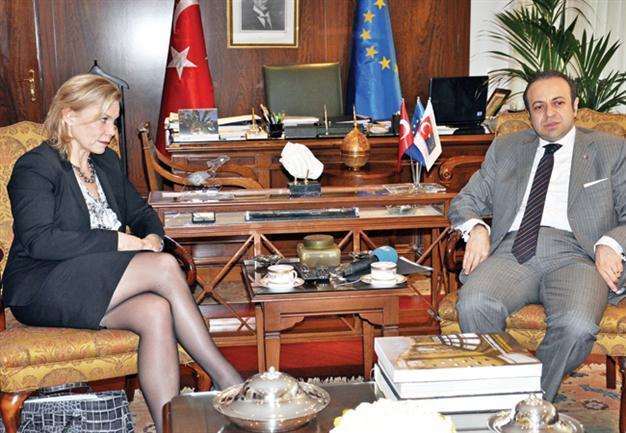Turkey and EU need each other, says Bağış
ISTANBUL - Anatolia News Agency

EU Minister Egemen Bağış (R) presents Hürriyet Daily News and daily Radikal to Swedish Minister for International Development Cooperation Gunilla Carlsson. AA photo
Turkey’s European Union Minister Egemen Bağış said yesterday that neither the European Union nor Turkey could afford to shut their doors on each other, adding relations were too complicated to ignore. “Neither the EU nor Turkey have the luxury of saying ‘no’ to the other. Our relations have never been this interdependent before,” Bağış told a round table meeting with Swedish Minister for International Development Cooperation Gunilla Carlsson in Istanbul.Hürriyet Daily News and Radikal published a joint article yesterday by Carlsson and Bağış titled “Sweden and Turkey partnering for the future.” Bağış presented Carlsson with the two newspapers when the two met in Istanbul.
“All [of the EU’s] members had their hardships when they were candidates, but we have waited for 45 years just to become [a candidate],” Bağış said at the meeting. Bağış also criticized the EU’s blocking most of Turkey’s accession talks, adding, “On the one hand they tell us to work on legal system and freedom of the press, but on the other hand they do not let us carry on with our membership talks. They want us to do our homework without actually telling us what our homework is.”
The Swedish minister, on her part, said it was unacceptable to stall Turkey’s accession negotiations because of bilateral issues that have nothing to do with the EU itself. “We believe that a struggle should be waged to embrace common values that people deeply own, such as democracy, individual freedom and the free market,” Carlsson said. Carlsson underlined the progress Turkey has made in the areas of democracy, minority rights and constitutional reforms, saying that Turkey draws closer every day to meeting the EU’s criteria despite what she called persistent problems with freedom of speech.
















